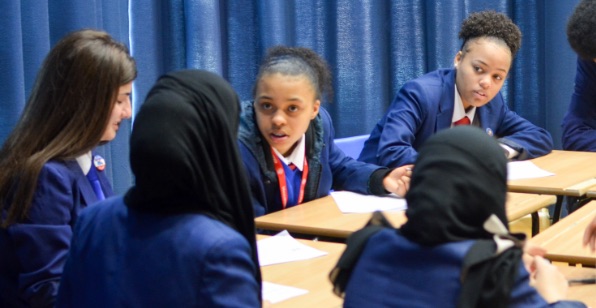Impact
Key to SNS’s theory of change is the unique use of young Israeli and Palestinian peace activists as visiting speakers who volunteer for the project. The experience of meeting ordinary young people born into a conflict who are close to their own age produces real attitudinal change, and the speakers are an inspiring role model for students.
Programme elements & impact:
Solutions Not Sides has gathered feedback from thousands of participants over the past decade via a feedback form completed at the end of each student's participation in our programme. We have also conducted two in depth and more long-term impact studies involving one-hour-long interviews with a total of 13 students several months or even (in some cases) years after their participation.
The results of both the feedback forms and the interviews showed three main outcomes of SNS:
- Humanisation and empathy
- Ability to embrace complexity and diversity rather than feeling threatened by it
- Empowerment through acquisition of skills, confidence and knowledge to influence others
The results including their comments on the need they felt for this programme before participating, the learning outcomes for them and the way it has personally affected their lives can be viewed here:
Solutions Not Sides is an essential piece of a wider puzzle of organisations working with young people to counter racism and build bridges across communities in the UK. We partner with organisations such as Anne Frank Trust, StandUp!, Hope Not Hate, Holocaust Educational Trust, Parallel Histories and others, bringing our unique expertise to complete the educational picture.

Initial responses indicated in student feedback:
-
Expressing an appreciation of the ‘safe-space’ atmosphere, and the confidence it engenders for participants to ask difficult, but important questions
-
Expressing an appreciation for the quality and abilities of the visiting speakers
-
Expressing a sense of becoming more open-minded about the issues
-
Expressing an intention to follow the peaceful example of the visiting speakers
“Lesson was engaging and well-planned. Really good ideas shared, sensitive issues well tackled. Student response was superb”
— Teacher, Queensbury Academy, DunstableLearning outcomes indicated in student feedback:
-
Understanding of diverse perspectives
-
A non-partisan, solutions-focused attitude (not supporting one side against the other)
-
An acceptance of the shared humanity and equal human rights for all
-
Awareness that people from different backgrounds and perspectives, even those on opposing sides of a geo-political conflict, can treat each other and dialogue together respectfully without aggression
-
A shift from enmity to empathy regarding the human suffering of those previously perceived to be the ‘bad guys’
-
Awareness of and ability to make the distinction between the roles of political/violent actors (governmental and grassroots), and the majority of ordinary citizens
-
Awareness that violence will likely lead to continued conflict and suffering, not conflict resolution
-
Awareness of and ability to critically assess bias about the conflict in mainstream and social media